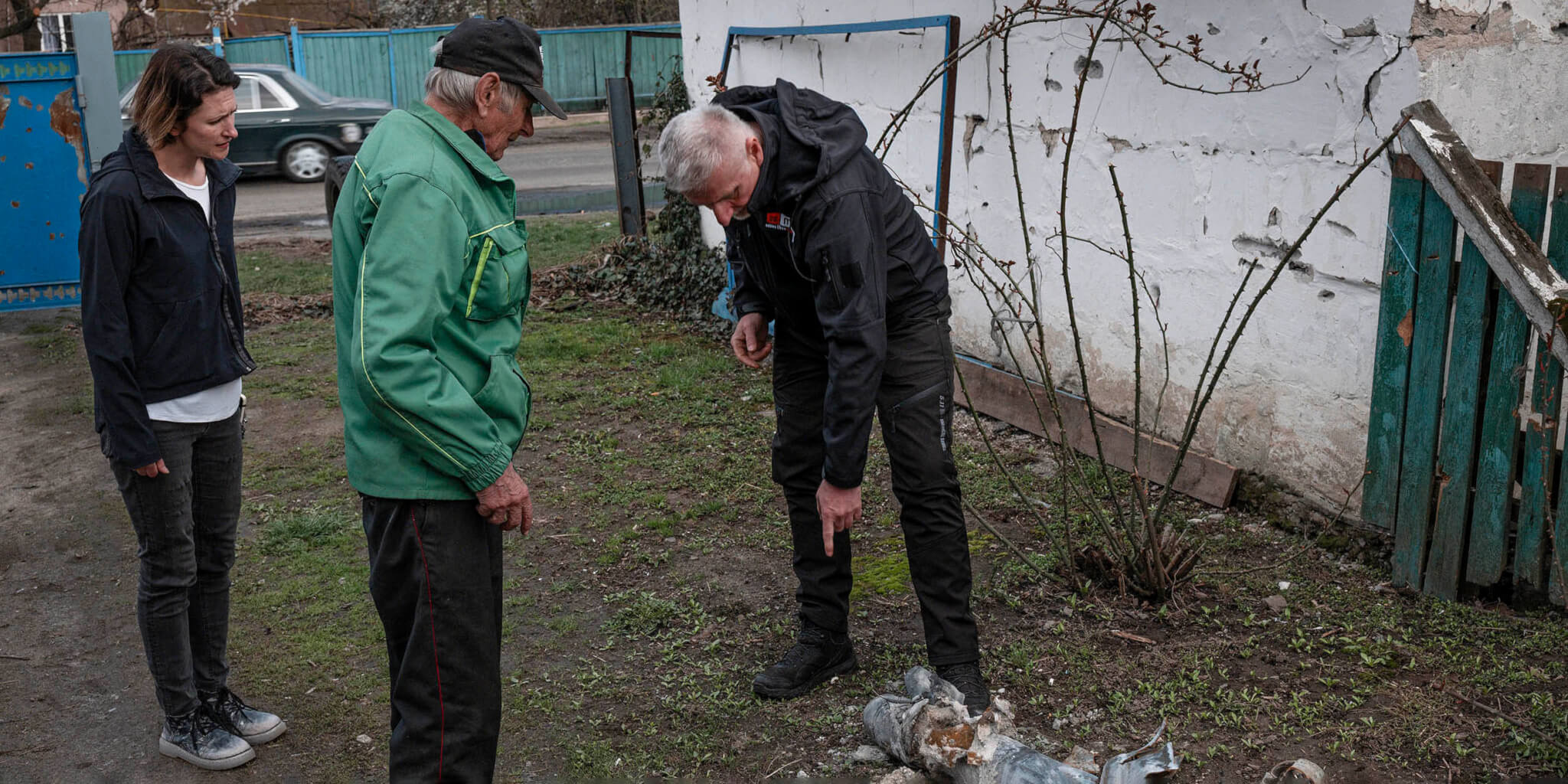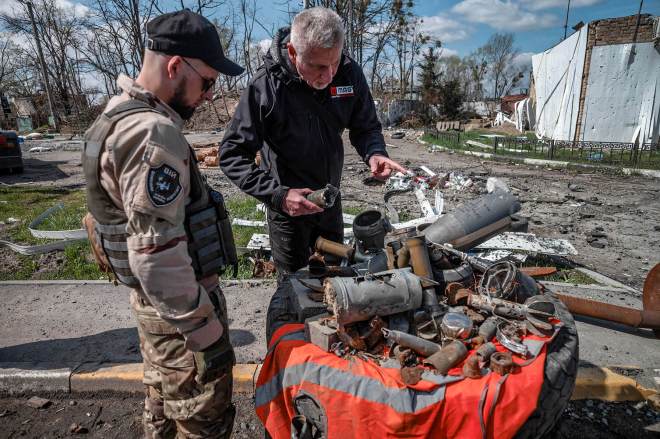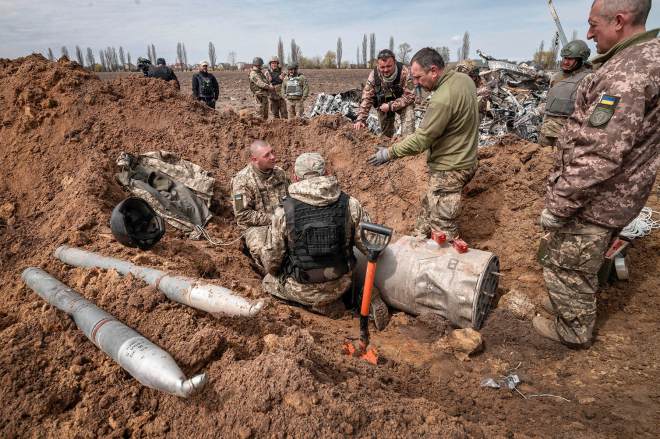
A father and daughter meet with a mine inspector in their backyard. PHOTO: Sean Sutton/MAG
September 28, 2022 | ATLANTA
For Release: IMMEDIATE
Media Contacts:
Dan Curran for UM Global Ministries and UMCOR
770-658-9586 (cell)
DanCurran@CurranPR.com
Jonathan Kyle, Communications Manager, MAG
+44 (0)7872964915
press@maginternational.org
Key facts:
- About 27% of Ukraine’s territory will need to be cleared of mines and explosives, according to Ukraine’s Ministry of Ecology and Natural Resources.
- Nearly 300,000 square kilometers (116,000 square miles) are still seen as “contaminated”, according to data released by Ukraine’s Emergency Services. Making that area safe could take a decade, the government said.
As the borders of war zones in Ukraine shift and change, some residents are returning home to find their neighborhoods and farms littered with mines and unexploded cluster munitions hidden to do the most harm. A new $2 million USD grant from the United Methodist Committee on Relief (UMCOR) to Mines Advisory Group (MAG) will help demine reclaimed ground, enable MAG teams to identify the exact location of unexploded ordnances and provide Ukrainians living in or returning to these areas with the education that will enable them to adopt safe behaviors to reduce the risk of accidents.

Explosive devices are often being placed to do harm to civilians. In Irpin, Lindila and Tatiana fled their apartments when the building next door was hit. When they returned, they could see through the crack of a blast-damaged door that a hand grenade had been placed on top of a large water dispenser. The authorities were informed and hopefully it will be dealt with soon.
As part of the General Board of Global Ministries, the mission and humanitarian assistance agency of The United Methodist Church, UMCOR provides relief and recovery response throughout the world. UMCOR is extensively engaged in providing aid and services for refugees and displaced people both inside Ukraine and beyond in the wake of the Russian invasion of late February 2022.
MAG is a long-time UMCOR partner and the two have worked together on past demining and explosive ordnance risk education projects in Africa, Asia and the Middle East. With a working knowledge of MAG’s provision of quality clearance and educational activities, UMCOR is now partnering with MAG to support the establishment of operations in Ukraine and all the administrative activities that go along with it.
“One of the tragedies of war is its impact on innocent civilians who played no part in the cause of the conflict,” said Roland Fernandes, general secretary of the General Board of Global Ministries of The United Methodist Church, which includes the United Methodist Committee on Relief (UMCOR). “Mine clearance and education are critically needed in Ukraine due to extensive contamination and the trend of people returning from Western Ukraine and abroad who may not be aware of the precise location of where these weapons designed to kill or maim are located.”
Darren Cormack, chief executive of MAG, said: “I have been in Kyiv seeing first-hand the devastating effects of the conflict. The use of heavy artillery, landmines, cluster munitions, both in rural and populated areas, has left a devastating and deadly legacy. Land that should be used for agriculture, or homes that should provide shelter for children to play and sleep, especially as we go into the hard Ukrainian winter, are too risky to be used.

“The challenges ahead are monumental and potentially growing as new territory is liberated in Kharkiv, a city and region that has undergone months of intense, bitter ground-fighting accompanied by a brutal artillery campaign.
“This UMCOR funding is of critical importance because it will enable us to scale-up and accelerate our efforts to keep people safe, working in close co-operation with local partners.”
UMCOR’s grant to MAG will enable MAG to accomplish several goals, including:
- Establish operations and a program structure that will facilitate long-term mine identification and removal activities in Ukraine. This will benefit communities, internally displaced persons (IDPs) and returnees living in and/or returning to their homes.
- Provide education to vulnerable populations, including women, men, girls and boys who are living in, or returning to, explosive ordnance contaminated areas in Kyiv Oblast, so they are aware of the risks from landmines and other deadly items. Explosive Ordinances Risk Education (EORE) training will be conducted in face-to-face sessions for 10,000 beneficiaries and via a digital campaign designed to reach 5,000,000 people.
- Reduce risk threat through the use of site surveys and metrics analysis, explosive ordnance disposal and clearance operations so that 100% of landmines and explosive ordnance found are destroyed. Support the Ukrainian Deminers Association and efforts to develop Explosive Ordinances Risk Education (EORE) content and conduct a basic deminer course and Explosive Ordnance Disposal training for up to 20 candidates.
Ukraine has signed the 1997 Mine Ban Treaty that comprehensively prohibits all types of victim-activated explosive devices. Russia has not joined the treaty but is bound by the prohibitions and restrictions on mines, booby-traps and other devices under the United Nations Convention on Conventional Weapons.
To support UMCOR’s continued efforts to offer immediate relief and long-term recovery for the war in Ukraine, make a gift to Advance #982450.
###
About UMCOR and the General Board of Global Ministries of The United Methodist Church
Founded in 1940, the United Methodist Committee on Relief is the global humanitarian relief agency of The United Methodist Church. A part of Global Ministries, UMCOR works in more than 80 countries worldwide, including the United States and its territories. The agency’s mission, grounded in the teachings of Jesus, is to alleviate human suffering with open hearts and minds to all people. Working in the areas of disaster response and recovery, sustainable development and migration, UMCOR responds to natural or civil disasters that are interruptions of such magnitude that they overwhelm a community’s ability to recover on its own. Learn more about UMCOR by visiting www.umcor.org or by following www.facebook.com/umcor and www.twitter.com/umc_umcor.
About MAG
MAG is a global humanitarian and advocacy organisation that finds, removes and destroys landmines, cluster munitions and unexploded bombs from places affected by conflict. MAG also provides education programmes, particularly for children, so people can live, work and play as safely as possible until they clear the land.
The organisation, which employs some 5,800 people in 27 countries, also delivers work to reduce armed violence by educating people about the risks of small arms and light weapons and by destroying and marking weapons and helping authorities to safely store arms and ammunition.
Since 1989, MAG has helped over 20 million people in 70 countries rebuild their lives after war. In 1997, MAG shared the Nobel Peace Prize for its role in banning landmines. For more information and regular updates, visit maginternational.org and follow us on Twitter @magsaveslives.

